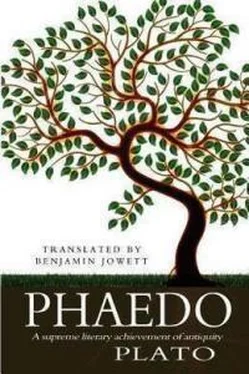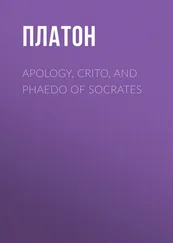Платон - Phaedo
Здесь есть возможность читать онлайн «Платон - Phaedo» весь текст электронной книги совершенно бесплатно (целиком полную версию без сокращений). В некоторых случаях можно слушать аудио, скачать через торрент в формате fb2 и присутствует краткое содержание. Год выпуска: 2014, Издательство: epubBooks Classics, Жанр: Философия, на английском языке. Описание произведения, (предисловие) а так же отзывы посетителей доступны на портале библиотеки ЛибКат.
- Название:Phaedo
- Автор:
- Издательство:epubBooks Classics
- Жанр:
- Год:2014
- ISBN:нет данных
- Рейтинг книги:3 / 5. Голосов: 1
-
Избранное:Добавить в избранное
- Отзывы:
-
Ваша оценка:
- 60
- 1
- 2
- 3
- 4
- 5
Phaedo: краткое содержание, описание и аннотация
Предлагаем к чтению аннотацию, описание, краткое содержание или предисловие (зависит от того, что написал сам автор книги «Phaedo»). Если вы не нашли необходимую информацию о книге — напишите в комментариях, мы постараемся отыскать её.
Phaedo — читать онлайн бесплатно полную книгу (весь текст) целиком
Ниже представлен текст книги, разбитый по страницам. Система сохранения места последней прочитанной страницы, позволяет с удобством читать онлайн бесплатно книгу «Phaedo», без необходимости каждый раз заново искать на чём Вы остановились. Поставьте закладку, и сможете в любой момент перейти на страницу, на которой закончили чтение.
Интервал:
Закладка:
Socrates replied with a smile: O Simmias, what are you saying? I am not very likely to persuade other men that I do not regard my present situation as a misfortune, if I cannot even persuade you that I am no worse off now than at any other time in my life. Will you not allow that I have as much of the spirit of prophecy in me as the swans? For they, when they perceive that they must die, having sung all their life long, do then sing more lustily than ever, rejoicing in the thought that they are about to go away to the god whose ministers they are. But men, because they are themselves afraid of death, slanderously affirm of the swans that they sing a lament at the last, not considering that no bird sings when cold, or hungry, or in pain, not even the nightingale, nor the swallow, nor yet the hoopoe; which are said indeed to tune a lay of sorrow, although I do not believe this to be true of them any more than of the swans. But because they are sacred to Apollo, they have the gift of prophecy, and anticipate the good things of another world, wherefore they sing and rejoice in that day more than they ever did before. And I too, believing myself to be the consecrated servant of the same God, and the fellow–servant of the swans, and thinking that I have received from my master gifts of prophecy which are not inferior to theirs, would not go out of life less merrily than the swans. Never mind then, if this be your only objection, but speak and ask anything which you like, while the eleven magistrates of Athens allow.
Very good, Socrates, said Simmias; then I will tell you my difficulty, and Cebes will tell you his. I feel myself, (and I daresay that you have the same feeling), how hard or rather impossible is the attainment of any certainty about questions such as these in the present life. And yet I should deem him a coward who did not prove what is said about them to the uttermost, or whose heart failed him before he had examined them on every side. For he should persevere until he has achieved one of two things: either he should discover, or be taught the truth about them; or, if this be impossible, I would have him take the best and most irrefragable of human theories, and let this be the raft upon which he sails through life—not without risk, as I admit, if he cannot find some word of God which will more surely and safely carry him. And now, as you bid me, I will venture to question you, and then I shall not have to reproach myself hereafter with not having said at the time what I think. For when I consider the matter, either alone or with Cebes, the argument does certainly appear to me, Socrates, to be not sufficient.
Socrates answered: I dare say, my friend, that you may be right, but I should like to know in what respect the argument is insufficient.
In this respect, replied Simmias:—Suppose a person to use the same argument about harmony and the lyre—might he not say that harmony is a thing invisible, incorporeal, perfect, divine, existing in the lyre which is harmonized, but that the lyre and the strings are matter and material, composite, earthy, and akin to mortality? And when some one breaks the lyre, or cuts and rends the strings, then he who takes this view would argue as you do, and on the same analogy, that the harmony survives and has not perished—you cannot imagine, he would say, that the lyre without the strings, and the broken strings themselves which are mortal remain, and yet that the harmony, which is of heavenly and immortal nature and kindred, has perished—perished before the mortal. The harmony must still be somewhere, and the wood and strings will decay before anything can happen to that. The thought, Socrates, must have occurred to your own mind that such is our conception of the soul; and that when the body is in a manner strung and held together by the elements of hot and cold, wet and dry, then the soul is the harmony or due proportionate admixture of them. But if so, whenever the strings of the body are unduly loosened or overstrained through disease or other injury, then the soul, though most divine, like other harmonies of music or of works of art, of course perishes at once, although the material remains of the body may last for a considerable time, until they are either decayed or burnt. And if any one maintains that the soul, being the harmony of the elements of the body, is first to perish in that which is called death, how shall we answer him?
Socrates looked fixedly at us as his manner was, and said with a smile: Simmias has reason on his side; and why does not some one of you who is better able than myself answer him? for there is force in his attack upon me. But perhaps, before we answer him, we had better also hear what Cebes has to say that we may gain time for reflection, and when they have both spoken, we may either assent to them, if there is truth in what they say, or if not, we will maintain our position. Please to tell me then, Cebes, he said, what was the difficulty which troubled you?
Cebes said: I will tell you. My feeling is that the argument is where it was, and open to the same objections which were urged before; for I am ready to admit that the existence of the soul before entering into the bodily form has been very ingeniously, and, if I may say so, quite sufficiently proven; but the existence of the soul after death is still, in my judgment, unproven. Now my objection is not the same as that of Simmias; for I am not disposed to deny that the soul is stronger and more lasting than the body, being of opinion that in all such respects the soul very far excels the body. Well, then, says the argument to me, why do you remain unconvinced?—When you see that the weaker continues in existence after the man is dead, will you not admit that the more lasting must also survive during the same period of time? Now I will ask you to consider whether the objection, which, like Simmias, I will express in a figure, is of any weight. The analogy which I will adduce is that of an old weaver, who dies, and after his death somebody says:—He is not dead, he must be alive;—see, there is the coat which he himself wove and wore, and which remains whole and undecayed. And then he proceeds to ask of some one who is incredulous, whether a man lasts longer, or the coat which is in use and wear; and when he is answered that a man lasts far longer, thinks that he has thus certainly demonstrated the survival of the man, who is the more lasting, because the less lasting remains. But that, Simmias, as I would beg you to remark, is a mistake; any one can see that he who talks thus is talking nonsense. For the truth is, that the weaver aforesaid, having woven and worn many such coats, outlived several of them, and was outlived by the last; but a man is not therefore proved to be slighter and weaker than a coat. Now the relation of the body to the soul may be expressed in a similar figure; and any one may very fairly say in like manner that the soul is lasting, and the body weak and shortlived in comparison. He may argue in like manner that every soul wears out many bodies, especially if a man live many years. While he is alive the body deliquesces and decays, and the soul always weaves another garment and repairs the waste. But of course, whenever the soul perishes, she must have on her last garment, and this will survive her; and then at length, when the soul is dead, the body will show its native weakness, and quickly decompose and pass away. I would therefore rather not rely on the argument from superior strength to prove the continued existence of the soul after death. For granting even more than you affirm to be possible, and acknowledging not only that the soul existed before birth, but also that the souls of some exist, and will continue to exist after death, and will be born and die again and again, and that there is a natural strength in the soul which will hold out and be born many times—nevertheless, we may be still inclined to think that she will weary in the labours of successive births, and may at last succumb in one of her deaths and utterly perish; and this death and dissolution of the body which brings destruction to the soul may be unknown to any of us, for no one of us can have had any experience of it: and if so, then I maintain that he who is confident about death has but a foolish confidence, unless he is able to prove that the soul is altogether immortal and imperishable. But if he cannot prove the soul's immortality, he who is about to die will always have reason to fear that when the body is disunited, the soul also may utterly perish.
Читать дальшеИнтервал:
Закладка:
Похожие книги на «Phaedo»
Представляем Вашему вниманию похожие книги на «Phaedo» списком для выбора. Мы отобрали схожую по названию и смыслу литературу в надежде предоставить читателям больше вариантов отыскать новые, интересные, ещё непрочитанные произведения.
Обсуждение, отзывы о книге «Phaedo» и просто собственные мнения читателей. Оставьте ваши комментарии, напишите, что Вы думаете о произведении, его смысле или главных героях. Укажите что конкретно понравилось, а что нет, и почему Вы так считаете.










